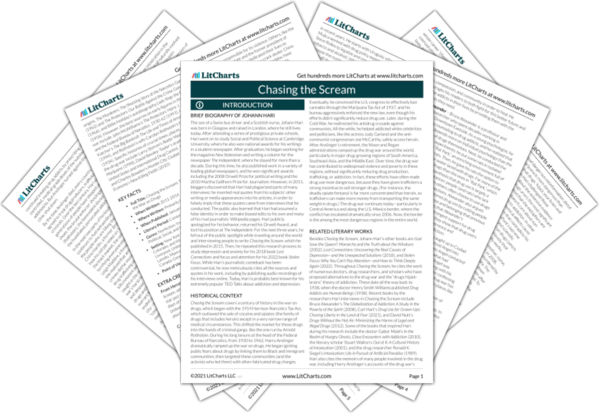Chino Hardin Quotes in Chasing the Scream
For Chino, the war on drugs was not a metaphor. It was a battlefield onto which he woke and on which he slept.
“That one act of human compassion…I went into her cell and started talking to her. And all my shit stopped.”
There will always be some people who are violent and disturbed and sadistic—but human beings respond to incentives. In Chino’s neighborhood, the financial incentives for a kid like him were to step up the violence and the sadism—because if he did, he would have a piece of one of the biggest and most profitable industries in America, and if he didn’t, he would be shut out and left in poverty.
In his office, Goulão told me there were two dimensions to Portugal’s drug revolution. The panel didn’t simply lift the legal penalties and leave people to it. They took the big, lumbering machinery of the drug war and turned it into an equally big, active machine to establish a drug peace. “The big effect of decriminalization,” he said, “was to make it possible to develop all the other policies.” In the United States, 90 percent of the money spent on drug policy goes to policing and punishment, with 10 percent going to treatment and prevention. In Portugal, the ratio is the exact opposite.
With legalization, the fevered poetry of the drug war has turned into the flat prose of the drug peace. Drugs have been turned into a topic as banal as selling fish, or tires, or lightbulbs.
As Barbara speaks, all the killing—from Arnold Rothstein to Chino’s gang to the Zetas—is being replaced by contracts. All the guns are being replaced by subordinate clauses. All the grief is being replaced by regulators and taxes and bureaucrats with clipboards.
[…]
I am bored at last, and I realize a tear of relief is running down my cheek.

Chino Hardin Quotes in Chasing the Scream
For Chino, the war on drugs was not a metaphor. It was a battlefield onto which he woke and on which he slept.
“That one act of human compassion…I went into her cell and started talking to her. And all my shit stopped.”
There will always be some people who are violent and disturbed and sadistic—but human beings respond to incentives. In Chino’s neighborhood, the financial incentives for a kid like him were to step up the violence and the sadism—because if he did, he would have a piece of one of the biggest and most profitable industries in America, and if he didn’t, he would be shut out and left in poverty.
In his office, Goulão told me there were two dimensions to Portugal’s drug revolution. The panel didn’t simply lift the legal penalties and leave people to it. They took the big, lumbering machinery of the drug war and turned it into an equally big, active machine to establish a drug peace. “The big effect of decriminalization,” he said, “was to make it possible to develop all the other policies.” In the United States, 90 percent of the money spent on drug policy goes to policing and punishment, with 10 percent going to treatment and prevention. In Portugal, the ratio is the exact opposite.
With legalization, the fevered poetry of the drug war has turned into the flat prose of the drug peace. Drugs have been turned into a topic as banal as selling fish, or tires, or lightbulbs.
As Barbara speaks, all the killing—from Arnold Rothstein to Chino’s gang to the Zetas—is being replaced by contracts. All the guns are being replaced by subordinate clauses. All the grief is being replaced by regulators and taxes and bureaucrats with clipboards.
[…]
I am bored at last, and I realize a tear of relief is running down my cheek.











